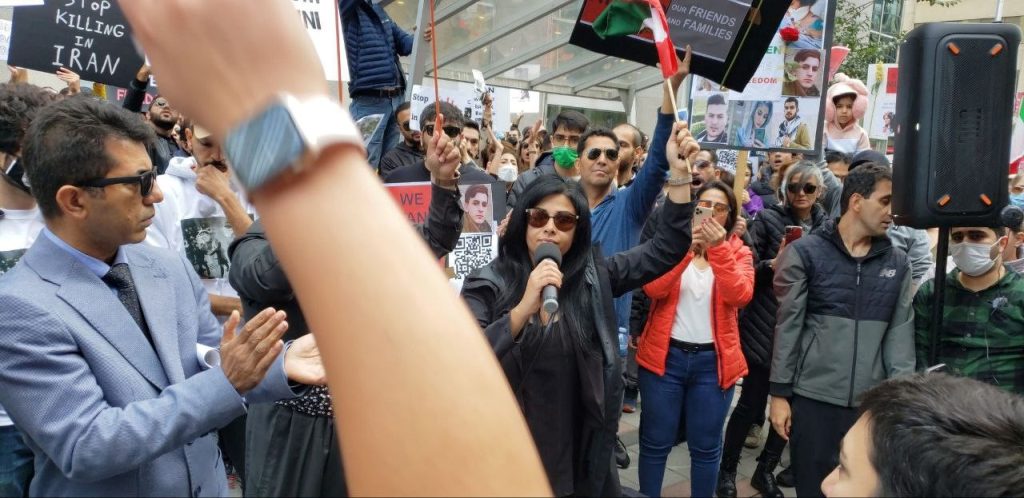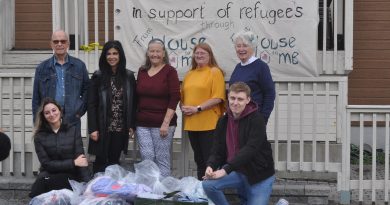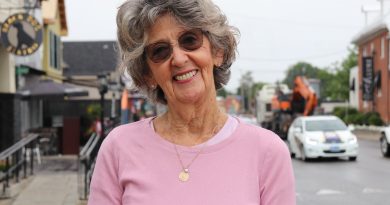Carleton MPP Ghamari Adds Powerful Voice To Ottawa Protest
More than 1,000 show up to protest against brutal treatment of women in Iran by terrorist regime
Carleton MPP Goldie Ghamari was front and centre last weekend, giving a strong voice that resonated both locally and nationally during the large downtown Ottawa protest against the brutal treatment of woman in Iran.
The protest was triggered by the death of 22-year-old Mahsa Amini in Iran. She died in custody after being detained by the country’s morality police for allegedly wearing her hijab incorrectly. Her death has caused widespread protests in Iran, and the protests are spreading to cities around the world where there are large Iranian populations.
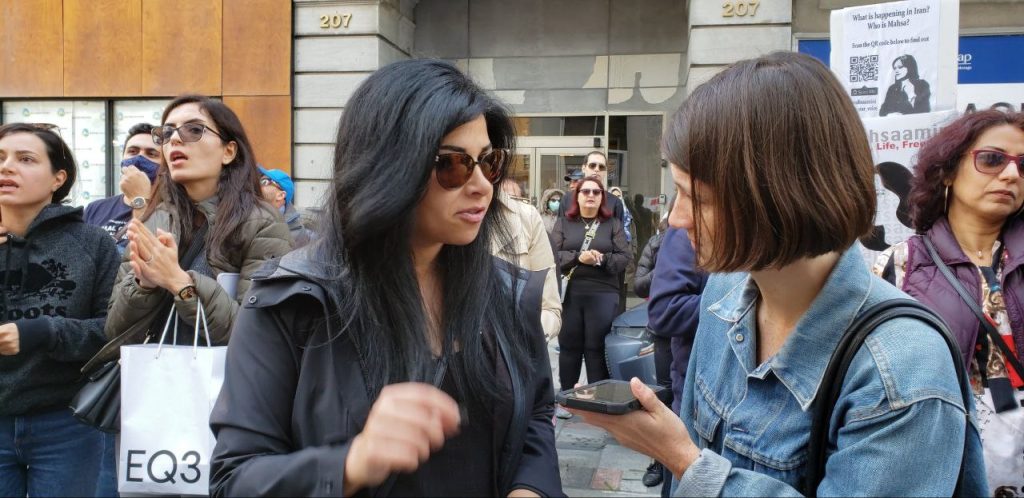
While the expected crowd was less than 100, an estimated turnout of more than 1,000 jammed downtown Ottawa. The crowd chanted Mahsa Amini’s name. Many of the protestors had their faces covered in fear that their images would be seen by the Iranian regime in their home country, and that they would retaliate by killing or torturing the family members of the protestors.
Ghamari posted on Twitter during the event that she was “honoured to join the hundreds of people in Ottawa who came out to support the people of Iran. Say her name. Be her voice.”
According to human rights organizations, at least 54 demonstrators have been killed by Iran’s security forces. They add that hundreds have been detained and beaten. Ghamari, as the first ever Iranian-Canadian woman ever elected in provincial or federal politics in Canada, offers an important voice in Canada for the people in Iran.
Ghamari arrived in Canada as a one-year-old with her parents. Her father, an electrical engineer, survived a random roadside execution attempt and made the decision to come to Canada to raise his daughters in a free and democratic society where they were safe. The family arrived in the mid 1980s with one suitcase full of clothing and $50 cash.
Protests Led By Women
“Mahsa Amini was a 22-year-old young woman who was brutally murdered by the illegitimate and terrorist regime in Iran just because she was not wearing her hijab properly,” she said.
Hijabs were not compulsory in Iran until the country’s Islamic revolution. Currently, only hijabs are only compulsory in Iran and Afghanistan.
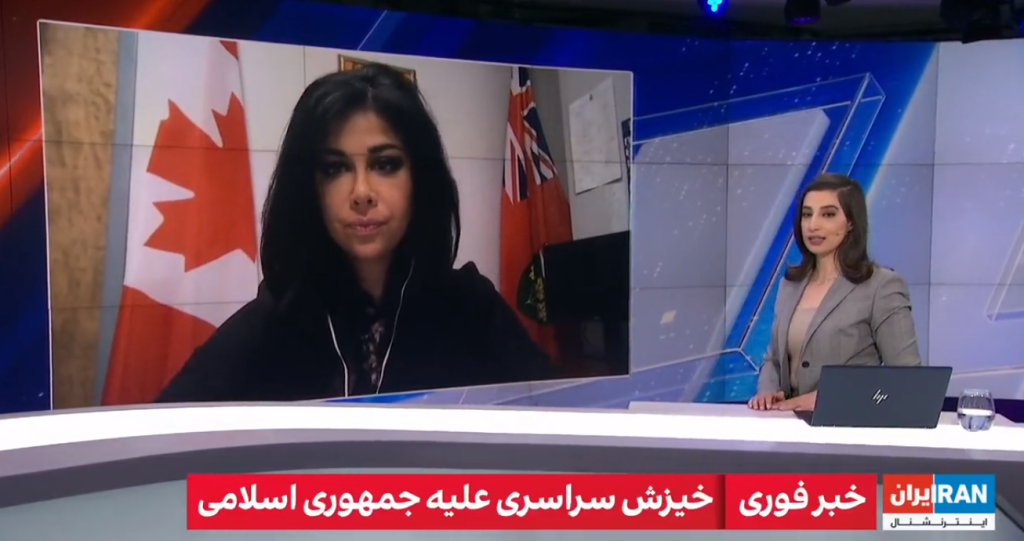
Ghamari said that what makes the riots in Iran unique is that they are being organized and led by women. She added that the death of Mahsa Amini was the final straw.
“The people in Iran want to live in a free and democratic society,” Ghamari said. “There are women of all ages in Iran out in public without their hijabs, and they are burning their hijabs in protest even though they are aware of the potential consequences.”
Sanctions against Iran
On Monday, Prime Minister Justin Trudeau announced that Canada will levy sanctions against Iranian entities and individuals. Although he was not specific in his announcement, one of those entities will be Iran’s morality police.
To the women in Iran who are protesting and to those who are supporting them: We are with you, Trudeau said.
In a CBC story posted Monday, Trudeau was quoted as saying, “We join our voices — the voices of all Canadians — to the millions of people around the world demanding that the Iranian government listen to its people, end their repression of freedom and rights, and let women and all Iranian people live their lives and express themselves peacefully.”
In January, 2020, Iran’s Islamic Revolutionary Guard Corps (IRGC) shot down Ukraine International airlines Flight 752 on its way from Tehran to Kyiv. There were 57 Canadians on board, including family members of residents in the Carleton riding.
The IRGC shot down the plane shortly after take off, killing all 176 passengers and crew members aboard. The shooting was in response to the assassination of IRGC major general Qasem Soleimani, who was killed by a US Air Force drone strike at Baghdad International Airport. Soleimani was considered a brutal mass murderer by the people Iran.
Since Iran shot down Flight PS752 there have been calls for Canada’s federal government to take a harder line on Iran and declare the country’s Islamic Revolutionary Guard Corps (IRGC) as a terrorist organization.
Trudeau told CBC that Canada already has one of the strongest sanctions against the regime.
“We have sanctioned some individuals, members of the IRGC, and we’re going to keep on considering anything else we can do with regard to sanctions,” he said.
Ghamari said that the sanctions announced by the Prime Minister were a step in the right direction, though she would like to see more done.
After Flight PS752, there were also riots and protests in Iran.
“After the riots two years ago, the Iranian regime shut down the internet for three days and murdered 1500 people.”
In the past, Ghamari has been critical of the Trudeau Government on social media for its inaction on terrorist activities by the regime. Ghamari is from the city of Ahvaz, which is the capital of the Iranian province of Khoozestan. In 2021, there were protests over the lack of clean drinking water in Khoozestan. Some of the protestors were shot and killed by the IRGC.
“The people of Iran are held hostage by a terrorist and illegitimate Islamic Regime,” she posted on Twitter in July, 2021. “They’re being murdered every day for peacefully protesting the lack of resources, lack of democracy, and lack of basic human rights.
“Where is #Trudeau? This self-proclaimed ‘feminist’ and leader of democracy’? Why has he remained silent.”
Ghamari posted a Global News photo of the Prime Minister smiling and shaking hands with Iranian Foreign Minister Javad Zarif in Munich a month after the downing of flight PS752.
Canada Must Do More
As the Carleton MPP was interviewed by numerous news agencies both locally and nationally last week, she called for more to be done to help Iran and make people aware of the situation there.
Ghamari said that while Iran is a country rich from oil, the economy is terrible and people have no opportunity. The money is being used to fund terrorism.
“The young people of Iran are highly educated, and more than 70 per cent of young people in Iran have university degrees,” she said. “But when they graduate, there are no jobs for them. When they ask the government why or if they speak out about the situation, they are thrown in jail.”
As the riots grow not just in Iran but throughout the world, Ghamari is sensing change. The riots in Canada and in Iran are being organized by women rather than being spearheaded by young men. Iran, she said, is a highly educated country with religious, political, cultural and ethnical diversity.
“What unites Iranians is our love of freedom and the desire for a free and democratic Iran,” she said.

